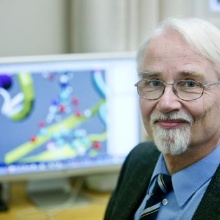The European Research Council awards the chemist Prof. Hans-Joachim Werner an ERC Grant in the funding line “Advanced Grants”. This 2.45 million Euro grant counts among the most prestigious research awards worldwide. A relevant contract on this was signed in Brussels on 22nd January 2013. In 2000 Prof. Werner had already been awarded the Leibniz Prize by the German Research Foundation. He manages the Institute for Theoretical Chemistry at the University of Stuttgart.
“Being awarded an ERC Advanced Grant is a great honour but also an enormous challenge. This
research grant makes it possible to tackle several projects over a period of five years, even risky
and protracted projects, which we don’t yet know whether they will work and be successful“,
explained Prof. Hans-Joachim Werner. ”Our aim is to develop theories and computer programmes to
simulate chemical reactions. Starting from the underlying physical laws and natural constants, the
properties and the reactivity of molecules should be able to be predicted without using empiric
information.“
We are very pleased that the research work performed by Prof. Hans-Joachim Werner is being
honoured by the European Research Council with an Advanced Grant“, according to University Rector
Prof. Wolfram Ressel, “this shows once again that the high level of research at our university.“
Werner and his team are attempting to calculate and understand the physical and chemical
properties of molecules as precisely as possible in terms of how molecules react with each other.
However, the theories necessary for this based on quantum mechanics are very complicated and the
calculations take a correspondingly long time. The computational effort with the best traditional
methods climbs steeply with the molecule size: by quadrupling by a factor 10,000. The Stuttgart
scientists, however, have found new approaches in recent years with which linear scaling can be
reached – ideally the computing time then only increases in the same case by a factor of 4. And if
this also doesn’t work to let the programme run parallelized on four processors, the execution time
even becomes independent of the molecule size. The further development of such scalable methods is
one of the aims of the ERC project.
Prof. Hans-Joachim Werner finds it fascinating that today many macroscopically measurable
properties of molecules can be very precisely calculated using theoretical methods, sometimes even
with smaller error limits than in the best measurements. For example, the structures and energies
of molecules or their spectra and colours can be calculated. It is also possible to predict how
quickly a reaction occurs and how much energy is thereby emitted or consumed. Such theoretical
calculations are required for the interpretation of many modern experiments. Yet it is not only
about collecting data but also understanding chemical reactions. One of the things the scientists
want to understand is why and how the catalysts or enzymes accelerate chemical and biological
processes and to derive from this how catalysts and chemical processes can be improved.
Further information:
Prof. Dr. Hans-Joachim Werner, University of Stuttgart, Institute for Theoretical Chemistry,
tel. 0711/685-64401, email: werner [at] theochem.uni-stuttgart.de.
Dr. Hans-Herwig Geyer, University of Stuttgart, Department University Communication, tel.
0711/685-82555, email: leitung.hkom [at] hkom.uni-stuttgart.de



